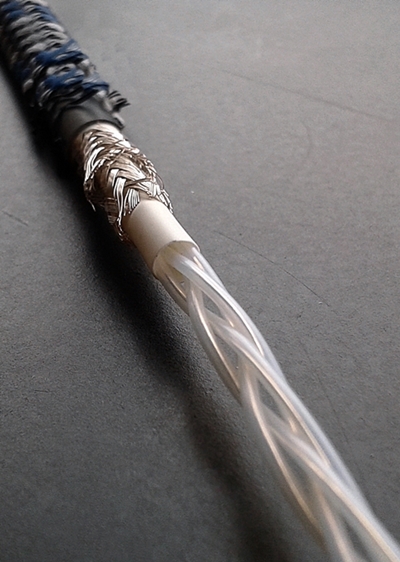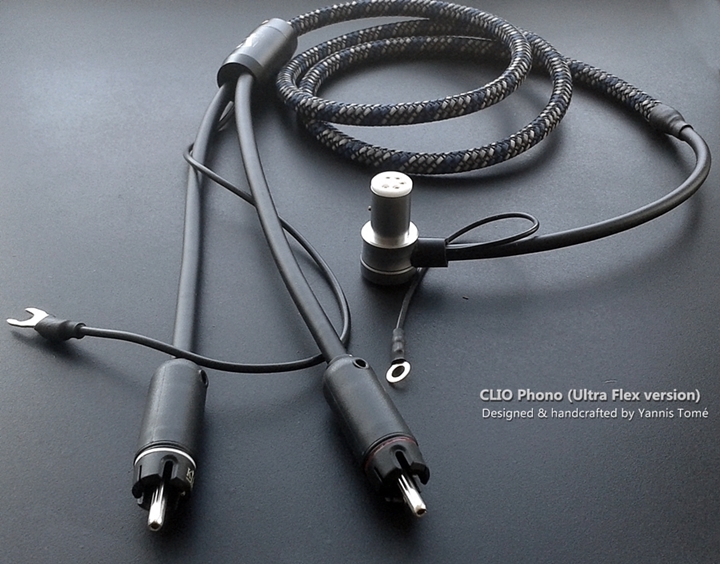

The Clio series of cables is a range of high fidelity, pure silver, analogue interconnect cables. For their production we have selected and used some of the highest quality materials in order to created a high performing, hype free cable.
The Clio series features cables with solid, pure OCC silver conductors. Their effective designs are topped up with high quality materials, much attention to detail and a professional finish in order to deliver the best possible performance. High purity, single crystal silver conductors, excellent combination of dielectrics, effective shielding, outstanding craftsmanship and finish and high quality connectors make these low capacitance cables suitable for any hi-fi system. The cables in the Clio series are characterized by a tight and articulate leading edge, speed and clarity. Their dynamics and extension can only be found in some of the very best cables in the market while their open tonal character is comparable to unshielded designs. Despite their moderate price these solid silver cables will impress and deliver sonic qualities rarely experienced in this price-range.
The CLIO Phono are ultra low capacitance tonearm cables (30pF/m).
They consist of 4 evenly matched, solid cores of pure, solid OCC Single Crystal Silver individually sleeved in oversized Teflon tubes (achieving an air/Teflon dielectric). They are braided into a round LITZ geometry and encased in a multilayered, medium density PTFE insulation.
The use of additional layers of low density PTFE between the core structure and the shields creates a level of bedding insulation with low dielectric involvement and excellent mechanical and electrical characteristics while providing the necessary spacing between the conductors and the shield. At the same time it ensures minimal movement preventing shifts of the cable impedances and vibration.
Clio Phono feature two overlapping layers of fine braided, silver plated OFC copper shields. Their combined density, skin depth and optical coverage ensure excellent response to both high and low frequency interference and a very low impedance path to the ground. The shielding of the cable does not interfere at all with the signal path and works as a Faraday cage preventing any interference from reaching the conductors and draining any noise that it picks up to the ground.
The outer protection of the cable aims at creating a good electrical insulation with suitable mechanical properties (i.e strength, flexibility, vibration absorbency etc) but also at isolating the conducting parts of the cable by any environmental impact. CLIO Phono use a very flexible silicone rubber jacket tp offer enhanced protection to the cable structure and it is finished with a flexible braided sleeve by Viablue (a combination of Monofilament PET and expanding fabric fillers). Overall a very robust but light and flexible construction that beyond the outstanding conductors it employs the most suitable dielectrics.
Clio uses some of the highest quality materials available and their construction and finish requires a significant amount of time and much attention. As you can expect the cost of producing such a cable is quite high. However, we do all we can to keep our prices as close to the actual costs of production as possible and make them affordable. There are no added costs for marketing, administration, 3rd party distribution, fancy packaging etc. We simply offer what we describe; A fast, detailed and flexible cable, highly immune to EMI and RFI, that can deliver outstanding sonic performance under all circumstances.
We have been producing these Clio cables for over 12 years and until this day they have impressed anyone who has tried them and expected an entry level performance. They been compared with some of the top cables of the market and surprised with their ability to deliver some of the most demanding recordings in such a natural and detailed manner.
Selecting your product options:



Optional ground connection to the turntable chassis Most tuntables do not require this additional ground connection to their chassis. DIN tonearm cables always incorporate an internal ground connection in the tonearm connector. This option is only suitable for certain turntable models that have their chassis (or sub-chassis) electrically isolated by the tonearm mass (i.e. Linn LP12). In such cases we can supply the cable fitted with a suitable, additional ground lead to enable this connection (typically using an M4 ring terminal).
This option is only relevant if you choose to have your cable fitted with an angled tonearm connector. If you use a straight tonearm connector simply leave it to the default option
Not all tonearms have their pins rotated to the same direction. The pin orientation of your tonearm socket and the tonearm connector will determine the direction towards which the cable will exit the tonearm/turntable. By default all of our angled tonearm connectors are configured using “option 1” orientation as shown in the images, which is the most common. The choice depends on how the pins of your tonearm socket are rotated.
Option 1 is the default option for the vast majority of tonearms and tonearm cables.
Option 2 (180deg.) is the second most frequent option. It is typically used on Jelco tonearms but also on some Audioquest, Audiomods, Fidelity Research and Roskan models.
Option 3 is quite rare but it is often used on some SME tonearms when there is the need for the cable to be routed downwards.
Option 4 is the least common and it is typically used on Graham tonearms.
It is always advised to check your tonearm and see how its output pins are rotated so that you can choose the best option according your set up and cable “dressing” preferences.

